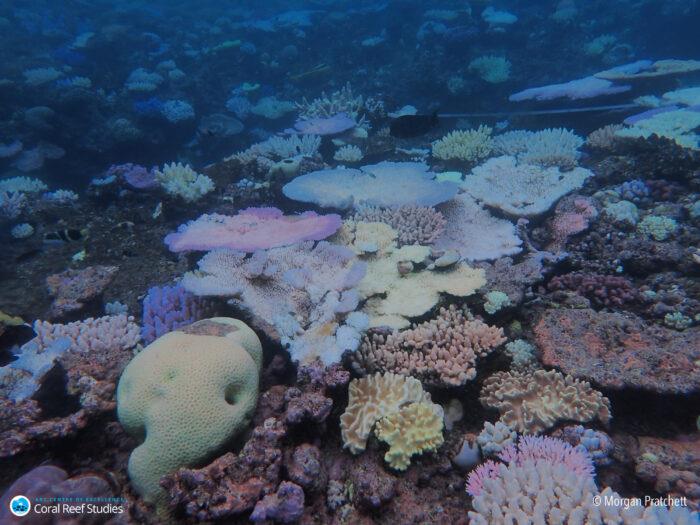
Time running out to save coral reefs
by Melissa Lyne 13 May 2021 05:18 UTC

Saving coral reefs requires immediate and drastic reductions in global carbon emissions. Photo of bleached reef at Yamacutta Flat © Morgan Pratchett
New research on the growth rates of coral reefs shows there is still a window of opportunity to save the world's coral reefs - but time is running out.
The international study was initiated at the ARC Centre of Excellence for Coral Reef Studies (Coral CoE), which is headquartered at James Cook University (JCU).
Co-author Professor Morgan Pratchett from Coral CoE at JCU said the results show that unless carbon dioxide emissions are drastically reduced the growth of coral reefs will be stunted.
"The threat posed by climate change to coral reefs is already very apparent based on recurrent episodes of mass coral bleaching," Prof Pratchett said. "But changing environmental conditions will have other far-reaching consequences."
Co-author Professor Ryan Lowe, from Coral CoE at The University of Western Australia (UWA), said modern coral reef structures reflect a balance between a wide range of organisms that build reefs, not just corals. This includes coralline algae—a rock-hard alga that bind reefs together.
"While the responses of individual reef organisms to climate change are increasingly clear, this study uniquely examines how the complex interactions between diverse communities of organisms responsible for maintaining present day coral reefs will likely change reef structures in the future," Prof Lowe said.
The joint lead authors, Dr Christopher Cornwall and Dr Steeve Comeau (who are now at Victoria University of Wellington and Sorbonne Université CNRS Laboratoire d'Océanographie de Villefranche sur Mer, respectively) calculated how coral reef growth is likely to react to ocean acidification and warming under three different climate-change carbon dioxide scenarios: low, medium and worst-case.
The findings suggest that under an intermediate emissions scenario, some reefs may even keep pace with sea-level rise by growing—but only for a short while.
"All reefs around the world will be eroding by the end of the century under the intermediate scenario," said co-author Dr Scott Smithers, from JCU. "This will obviously have serious implications for reefs, reef islands, as well as the people and other organisms depending upon coral reefs."
The study gives broader projections of ocean warming and acidification—and their interaction—on the net carbonate production of coral reefs.
Warming oceans bring more marine heatwaves, which cause mass coral bleaching. Ocean acidification affects the ability of calcifying corals to form their calcium carbonate skeletons, a process called 'calcification'. Warming waters also reduce calcification.
The data in the study include net calcification, bioerosion and sediment dissolution rates measured or collated from 233 locations across 183 distinct reefs. 49% of the reefs were in the Atlantic Ocean, 39% in the Indian Ocean and 11% in the Pacific Ocean.
These were then modelled against three Intergovernmental Panel on Climate Change emissions scenarios for low, medium and high-impact outcomes on ocean warming and acidification for 2050 and 2100.
The projections show that even under the low-impact case, reefs will suffer severely reduced growth, or accretion, rates.
"While 63% of reefs are projected to continue to accrete by 2100 under the low-impact pathway, 94% will be eroding by 2050 under the worse-case scenario," Dr Cornwall said. "And no reef will continue to accrete at rates matching projected sea-level rise under the medium and high-impact scenarios by 2100."
"Our study shows changing environmental conditions challenge the growth of reef-building corals and other calcifying organisms, which are important in maintaining the structure of reef systems," Prof Pratchett said.
"Saving coral reefs requires immediate and drastic reductions in global carbon emissions."
Paper
Cornwall C, Comeau S, Korndere N, Perry C, Van Hooidon R, DeCarlo T, Pratchett M, Anderson K, Browne N, Carpenter R, Diaz-Pulidoo G, D'Olivo J, Doo S, Figueiredo J, Fortunato S, Kennedy E, Lantz C, McCulloch M, González-Rivero M, Schoepf V, Smithers S, Lowe R. 2021. 'Global declines in coral reef calcium carbonate production under ocean acidification and warming'. PNAS. DOI: 10.1073/pnas.2015265118